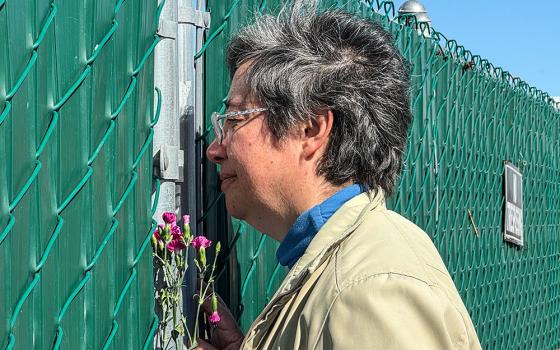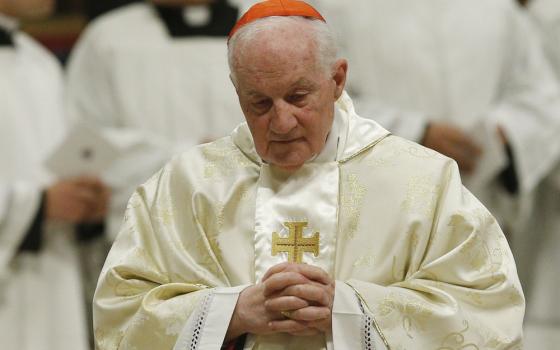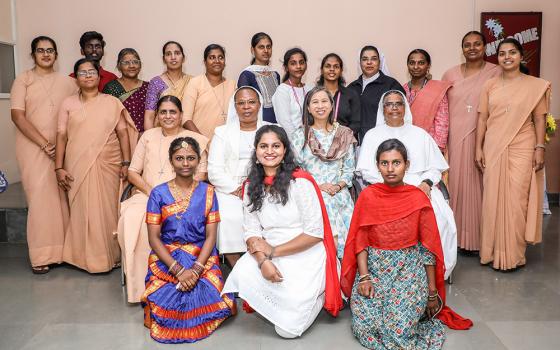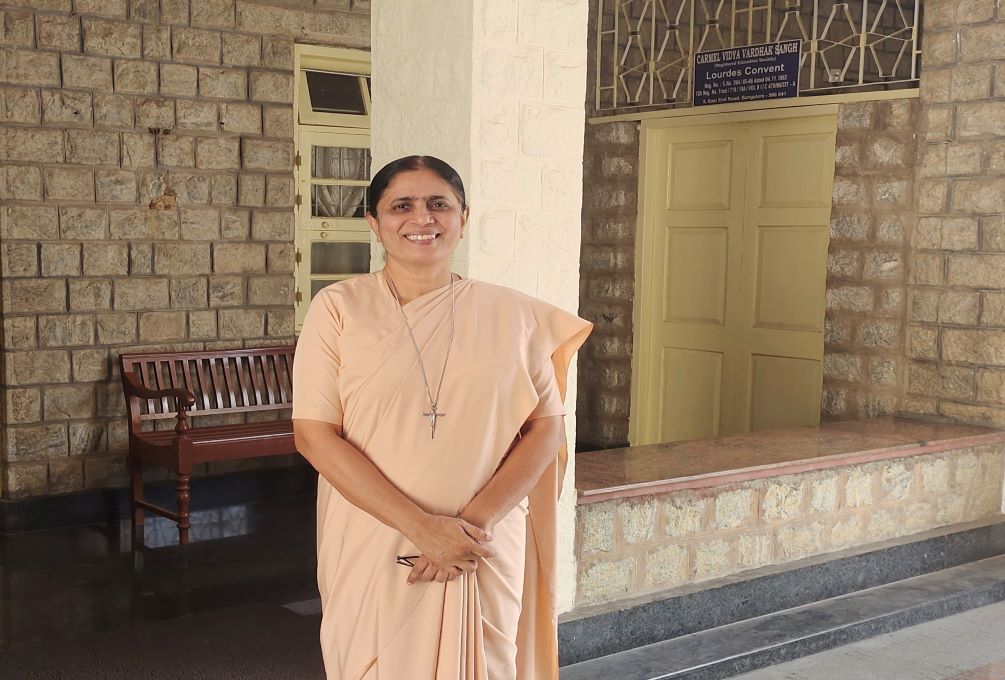
Sr. Maria Nirmalini, superior general of the Apostolic Carmel congregation, assumed the role of president of the Conference of Religious in India in January. (Thomas Scaria)
Sr. Maria Nirmalini, superior general of the Apostolic Carmel congregation, is the new president of Conference of Religious in India, the national body of religious major superiors. She also heads the women's section of the conference.
She was unanimously elected the conference president during its national executive meeting Nov 13, 2021, but she assumed office only in January this year.
An educator most her life, Nirmalini was honored with the Best Principal Award and Best Teacher Award by the state government of Delhi, and World Disaster Education Award instituted by the International Association of Educators for World Peace. She also was invited to address the German Bishops' Conference on the 2008 attacks on Christians in Kandhamal, in the eastern Indian state of Odisha.
In her first interview after becoming the head of India's more than 130,000 Catholic women and men religious, 103,000 of whom are professed sisters, Nirmalini on Feb. 21 shared with Global Sisters Report her views on various issues, especially the empowerment of women religious in India.
GSR: Congratulations on being elected as the Conference of Religious India president. What were your thoughts when you were elected to this highly responsible post?
Nirmalini: I was with our sisters in Pakistan when the CRI secretariat informed me about my election. Initially, I was a bit hesitant to accept the offer due to my busy schedule as the superior general of the Apostolic Carmel and the president of the CRI women's section. I prayed over it and decided to take up the challenge. I recalled that it was one of our members, Mother [Maria] Theodosia, who had played a key role in forming the CRI women's section in 1962 and served as its founder president. She inspired me to say yes. I knew my capacity or availability is not enough to shoulder this responsibility but, since I believe in teamwork, everything is possible. I believe, together, we can.
'Our strength is our capacity to transform others, and our weakness is our ignorance about our own power.'
—Sr. Maria Nirmalini
What are your immediate priorities as the head of CRI?
First, I have to address the mounting challenges faced by our sisters in India. I was first elected the head of the CRI women's section. So, let me start with them.
In February, the executive members of the women's section met at Goa. We discussed mostly the challenges of the women religious in India — the mysterious deaths of nuns, clergy sexual abuse, patriarchal oppression and property disputes.
We also took up a survey sponsored by the conference on challenges of the women religious in India. The survey results were presented as a book, "It's High Time." The conference did not officially publish the book, maybe because its findings revealed harsh realities and painful truths. But I assure you, my team will take up the recommendations.
What are your immediate proposals to address the challenges of women religious?
The first plan is to form a "grievance cell" with representations from women religious doctors, psychologists, lawyers, counselors and spiritual guides. If such a forum already exists, we will make it work. The forum will provide "confidential listening" to sisters from any congregation and assure them of our support. The thrust is not to make judgments, but to provide a platform for "listening, counseling and accompaniment."
Until now, we have not provided our sisters a platform to at least listen to them, forget about giving them support. We kept blaming patriarchal systems and clergy suppression. Time has come to empower sisters to become assertive and remain dignified while playing creative roles within the church. I want to see them "independent."
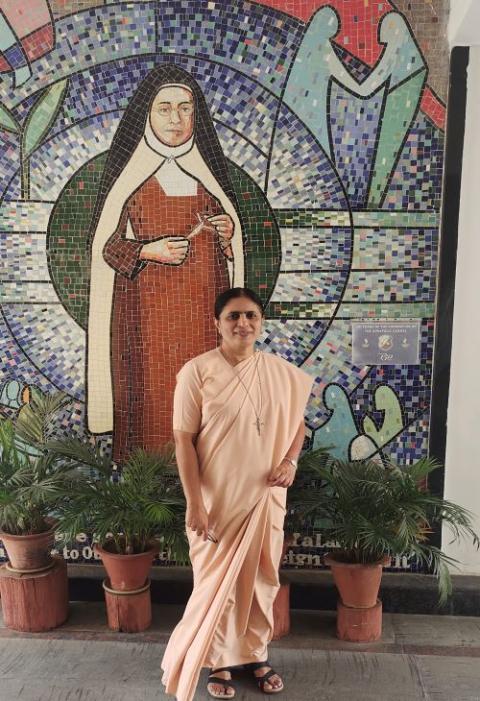
Sr. Maria Nirmalini, superior general of the Apostolic Carmel congregation in India, stands in front of a portrait of her community's founder, Mother Veronica of the Passion, at the generalate in Bengaluru. (Thomas Scaria)
What are strengths and weaknesses of women religious in India?
Our educational institutions are centers for transformation and empowerment. Our medical facilities give healing touch to all, our social work centers act as tools for justice, freedom and dignity for the least and the lost ones in society. We have a significant role in society, but sadly we have not realized our strengths or asserted our dignity as God's chosen women.
I was amazed to note that we have more than 1,000* qualified doctors, hundreds of lawyers, thousands of teachers, several engineers, social workers, psychologists and other professionals. And yet, we remain dependent, helpless and obedient. Our strength is our capacity to transform others, and our weakness is our ignorance about our own power.
So, do women religious need liberation from clergy imperialism?
I am not in a fight with the clergy. The men religious also have put their trust in me by electing me as the CRI president. I am here to uphold the equality, freedom and dignity of men and women religious. At the same time, I want women religious to become dignified, assertive and confident.
How?
The women religious serving dioceses should assert that they are there to serve the people, not the diocesan structures. Some women religious are afraid to protest if treated badly as they don't want priests to use the pulpit to belittle nuns before the laity. I have heard of such cases. It is such priests who need liberation from the patriarchal mentality that goes against the Christian spirit and witness.
What other challenges do Indian nuns face?
Another issue is lack of exposure and coordination among us. The more we are exposed to similar situations in other congregations, the more we become broadminded and focused. Sisters working in the education field hardly get to know another ministry. I have observed some nuns in positions refuse to admit the poor, even Catholic children, in their schools saying they are "less intelligent." We should not forget that we are primarily for "the lost and the least" in society.
This is similar in other ministries, too. This causes an imbalance. In my tenure, I plan to address this tendency nationally.
We also want to encourage more coordinated activities and exposure programs. People in education must serve in social apostolates or visit other fields. This can be done within the congregation or in collaboration with other congregations.
Advertisement
How will you encourage the intercongregational exposure programs?
By strengthening our regional and local CRI networks and encouraging more coordinated activities. During the pandemic most congregations significantly helped migrant laborers and the poor with food and medicines, but it was all done as individual congregations. We would encourage the CRI local units to work together in such situations. This will lead to exposure and rich experiences.
The exposure could cause exploitation. How will you address clergy sexual abuse?
The clergy abuse was a topic that we discussed seriously in Goa. The victims often remain silent for fear of taboo and to protect the church's image. Such an attitude only helps the clergy to take the nuns for granted. Not all priests are bad, but there are a few black sheep. Our silence can lead to more exploitation. The proposed helpline could encourage sisters to confide their problems and the grievance cell will take them up. I feel sorry for the silent victims, but they can break their silence now.
Your recent letter [Nirmalini was a primary drafter] to Cardinal Oswald Gracias regarding justice for the victim in the nun rape case has received international attention. Have you received any response?
I knew I would not get an official reply from the CBCI [Catholic Bishops' Conference of India. Gracias is its president]. But, the letter has generated a lot of discussions, in private and in public. That was my purpose. Some bishops wrote to me appreciating the move and some have even advised me to visit the victims at their Kuravilangad convent [in Kerala]. I was planning to visit them, anyway. They too belong to the CRI family.
It was a sad reality that neither CRI nor CBCI officially came forward to listen to the survivor and her five supporters so far. It was a mistake from the church. I do not want to judge anyone, but how can we forget our responsibility to at least listen to them?
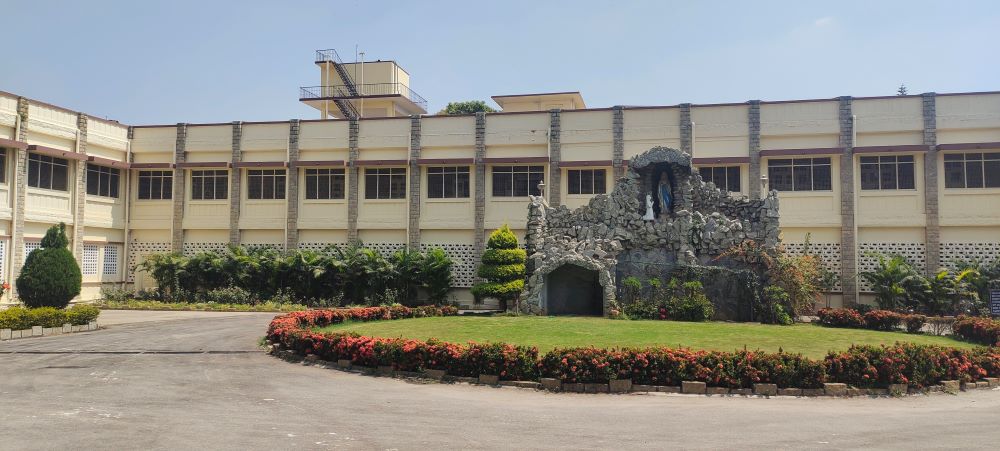
The headquarters of the Apostolic Carmel congregation in the southern Indian city of Bengaluru, where Sr. Maria Nirmalini is based (Thomas Scaria)
You have spoken more for women. But you are president of a body that includes priests and brothers. What are your priorities for them?
Only the new executive body of the women's section has taken charge now. The executive body of the entire conference is yet to assume office. Once this is done, we will form our priorities clearly.
However, one priority is to develop a culture of working together with mutual respect, acceptance and coordination. Promoting grassroots-level coordinated activities is another priority. The grievance cell will also take up their problems.
It is high time we recognized the role of laity in the church by promoting lay participation at all levels. We kept them away so far since we were afraid of sharing our power and assets. I am happy that some congregations are promoting lay associates. This is a good move. Vocations to congregations are dwindling. So the only alternative is to promote lay associates.
Tell us something about yourself. Why did you become a nun?
I was born and brought up in Mumbai in a devout Catholic family. My inspiration has always been my parents and their devotion to the church. Although I had a desire to become a nun, I waited until I completed my graduation to discern myself fully. During school and college days, I was part of the Legion of Mary, which acted as my foundation to my vocation.
In the Apostolic Carmel congregation, I served most of my time as an educationalist. A good part of my religious life was spent as the principal of the Carmel school in Delhi where I was engaged in social service, networking and leadership. Then I was elected a provincial and the superior general.
*An earlier version of this Q&A gave an incorrect number of sisters who are doctors in India.

